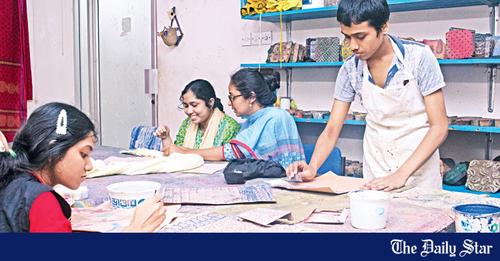
Danny’s journey of changing lives
Soon, he started developing symptoms of other associated disabilities — severe learning issues, reduced sensory and motor skills, beta-thalassemia, diabetes, and communication disorder.
When Seeam’s father refused to support his son’s treatment for his deteriorating conditions, the mother — Sajida Rahman Danny — took up the mantle of that responsibility.
And thus, began the mother’s battle.
Many schools rejected Seeam, and not only that, landlords refused to rent out their homes to Danny and Seeam.
“I was very young when my son was diagnosed. I neither got financial support from my family nor my husband after our divorce.”
“But I could never give up on Seeam. I kept my faith in him,” said Danny.
I’ve seen that all these children have tremendous potential and a drive to learn. We strive to recognise their talents and design teaching-learning methods according to their strengths and needs.
Facing these rejections and discriminatory attitudes towards her son, Danny was driven to launch a vocational training centre for children with neurodevelopmental disabilities called PFDA Vocational Training Center Trust in 2014.
Located at Mohakhali DOHS, this centre is currently teaching 200 children with ASD, cerebral palsy, down syndrome, and intellectual disability different vocational skills — like baking, sewing, painting, jewellery-making, skills related to food and beverage services, shopkeeping, computer operation, and much more. They also participate in different types of co-curricular activities such as singing, dancing, theatre and sports.
Danny had to leave her job at Unicef and sell off her property to launch the centre. The centre started with only six children with neuro-developmental disabilities.
“At that time, almost all my relatives discouraged me. I had a secure job with a good salary at that time, but I sacrificed it to establish the centre,” said Danny.
“I thought there are many parents like me who are struggling to help their children, and I must do something for them,” she added.
For Danny’s efforts, Seeam has completed “AS” level under British Council and got a job at a duty-free shop at Hazrat Shahjalal International Airport. He can interact with customers just like any other skilled professional and speaks three languages fluently.
Seeam said, “I can now use public transport or use ride-sharing apps. I can cook for myself and do most household chores. In most cases, I don’t need my mother’s help anymore.”
Ishaba Hafiz Sushmi, a girl with autism, also went through similar obstacles like Seeam. Overcoming stigma, she learned to sing, dance and act. At PFDA, she works in jewellery production.
This year, she even received an award for “Successful person with autism” from Prime Minister Sheikh Hasina. Her paintings were also selected for the prime minister’s Eid greeting cards.
Ishaba and a group of children with ASD participated in the Autistic Talent Gala, Hong Kong in 2019, and the team won awards in three categories.
According to Md Amir Hossain, senior programme specialist of PFDA-VTC, more than 100 PFDA graduates who have neurodevelopmental disabilities are now working in different organisations. Around 30 graduates are running their own businesses, or working from home due to lack of a proper atmosphere.
For admission at PFDA, the admission team interviews the child and family members to collect relevant data on the candidate.
Then the pre-admission team observes the potential student to develop a personalised training plan. The data is handled through a customised software called “CUMO”.
The team also suggests necessary therapy, vocational trades, and co-curricular activities for each student’s development. Finally, the candidate is admitted to either PFDA’s pre-vocation or vocation section.
Danny said most of these children remain confined to their home after being rejected from schools or after completing primary education.
“I’ve seen that all these children have tremendous potential and a drive to learn. We strive to recognise their talents and design teaching-learning methods according to their strengths and needs.”
“When we introduced this method in Bangladesh, most people told me that this wouldn’t work. However, I didn’t give up, and I believe that the decision I took in 2014 was right,” she added.
Since the establishment of PFDA-VTC, Danny, however, has been fighting countless obstacles centring around stigma and lack of financial support.
Lots of discriminatory and negative attitudes exist in our society against persons with disabilities. “Such a negative mindset creates insurmountable obstacles for us when we want to collect funds, resources, and support for this institution. We have to procure different types of expensive teaching-learning equipment for our students. Funding crisis remains a constant challenge,” she said.
A determined Danny now dreams of extending PFDA’s services to all over the country, accessible for people from all socioeconomic backgrounds.
